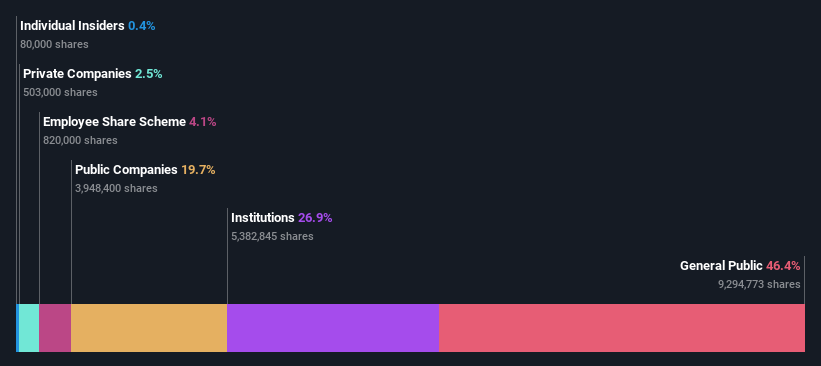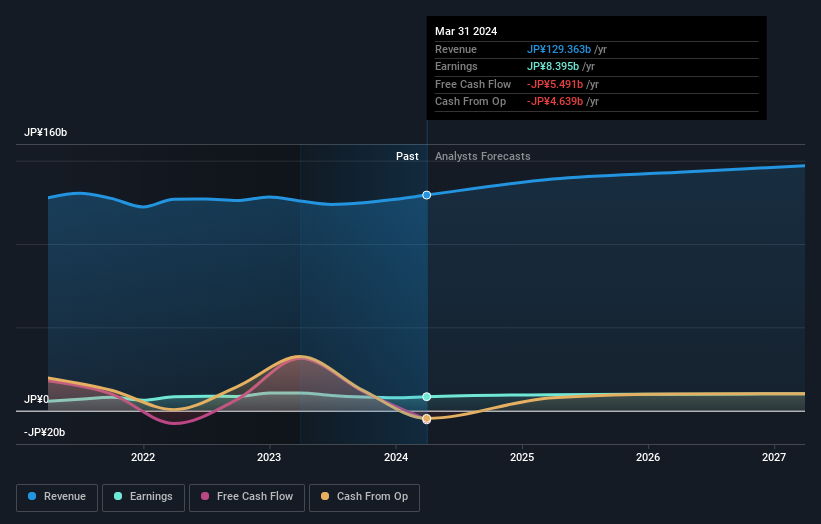- Japan
- /
- Construction
- /
- TSE:1968
Individual investors who have a significant stake must be disappointed along with institutions after Taihei Dengyo Kaisha, Ltd.'s (TSE:1968) market cap dropped by JP¥16b

Key Insights
- The considerable ownership by individual investors in Taihei Dengyo Kaisha indicates that they collectively have a greater say in management and business strategy
- 51% of the business is held by the top 15 shareholders
- Institutions own 27% of Taihei Dengyo Kaisha
To get a sense of who is truly in control of Taihei Dengyo Kaisha, Ltd. (TSE:1968), it is important to understand the ownership structure of the business. With 46% stake, individual investors possess the maximum shares in the company. Put another way, the group faces the maximum upside potential (or downside risk).
While the holdings of individual investors took a hit after last week’s 15% price drop, institutions with their 27% holdings also suffered.
Let's delve deeper into each type of owner of Taihei Dengyo Kaisha, beginning with the chart below.
Check out our latest analysis for Taihei Dengyo Kaisha

What Does The Institutional Ownership Tell Us About Taihei Dengyo Kaisha?
Many institutions measure their performance against an index that approximates the local market. So they usually pay more attention to companies that are included in major indices.
We can see that Taihei Dengyo Kaisha does have institutional investors; and they hold a good portion of the company's stock. This suggests some credibility amongst professional investors. But we can't rely on that fact alone since institutions make bad investments sometimes, just like everyone does. It is not uncommon to see a big share price drop if two large institutional investors try to sell out of a stock at the same time. So it is worth checking the past earnings trajectory of Taihei Dengyo Kaisha, (below). Of course, keep in mind that there are other factors to consider, too.

Taihei Dengyo Kaisha is not owned by hedge funds. Hikari Tsushin, Inc. is currently the largest shareholder, with 17% of shares outstanding. The Dai-Ichi Life Insurance Company, Limited, Asset Management Arm is the second largest shareholder owning 4.9% of common stock, and Taihei Dengyo Kaisha Ltd, ESOP holds about 4.1% of the company stock.
Looking at the shareholder registry, we can see that 51% of the ownership is controlled by the top 15 shareholders, meaning that no single shareholder has a majority interest in the ownership.
While studying institutional ownership for a company can add value to your research, it is also a good practice to research analyst recommendations to get a deeper understand of a stock's expected performance. There is a little analyst coverage of the stock, but not much. So there is room for it to gain more coverage.
Insider Ownership Of Taihei Dengyo Kaisha
While the precise definition of an insider can be subjective, almost everyone considers board members to be insiders. The company management answer to the board and the latter should represent the interests of shareholders. Notably, sometimes top-level managers are on the board themselves.
I generally consider insider ownership to be a good thing. However, on some occasions it makes it more difficult for other shareholders to hold the board accountable for decisions.
Our most recent data indicates that insiders own less than 1% of Taihei Dengyo Kaisha, Ltd.. We do note, however, it is possible insiders have an indirect interest through a private company or other corporate structure. It has a market capitalization of just JP¥89b, and the board has only JP¥354m worth of shares in their own names. Many tend to prefer to see a board with bigger shareholdings. A good next step might be to take a look at this free summary of insider buying and selling.
General Public Ownership
The general public, who are usually individual investors, hold a 46% stake in Taihei Dengyo Kaisha. While this group can't necessarily call the shots, it can certainly have a real influence on how the company is run.
Public Company Ownership
It appears to us that public companies own 20% of Taihei Dengyo Kaisha. This may be a strategic interest and the two companies may have related business interests. It could be that they have de-merged. This holding is probably worth investigating further.
Next Steps:
It's always worth thinking about the different groups who own shares in a company. But to understand Taihei Dengyo Kaisha better, we need to consider many other factors. Case in point: We've spotted 4 warning signs for Taihei Dengyo Kaisha you should be aware of, and 1 of them is concerning.
Ultimately the future is most important. You can access this free report on analyst forecasts for the company.
NB: Figures in this article are calculated using data from the last twelve months, which refer to the 12-month period ending on the last date of the month the financial statement is dated. This may not be consistent with full year annual report figures.
Valuation is complex, but we're here to simplify it.
Discover if Taihei Dengyo Kaisha might be undervalued or overvalued with our detailed analysis, featuring fair value estimates, potential risks, dividends, insider trades, and its financial condition.
Access Free AnalysisHave feedback on this article? Concerned about the content? Get in touch with us directly. Alternatively, email editorial-team (at) simplywallst.com.
This article by Simply Wall St is general in nature. We provide commentary based on historical data and analyst forecasts only using an unbiased methodology and our articles are not intended to be financial advice. It does not constitute a recommendation to buy or sell any stock, and does not take account of your objectives, or your financial situation. We aim to bring you long-term focused analysis driven by fundamental data. Note that our analysis may not factor in the latest price-sensitive company announcements or qualitative material. Simply Wall St has no position in any stocks mentioned.
Have feedback on this article? Concerned about the content? Get in touch with us directly. Alternatively, email editorial-team@simplywallst.com
About TSE:1968
Taihei Dengyo Kaisha
Engages in the plant construction business in Japan and internationally.
Excellent balance sheet slight.

